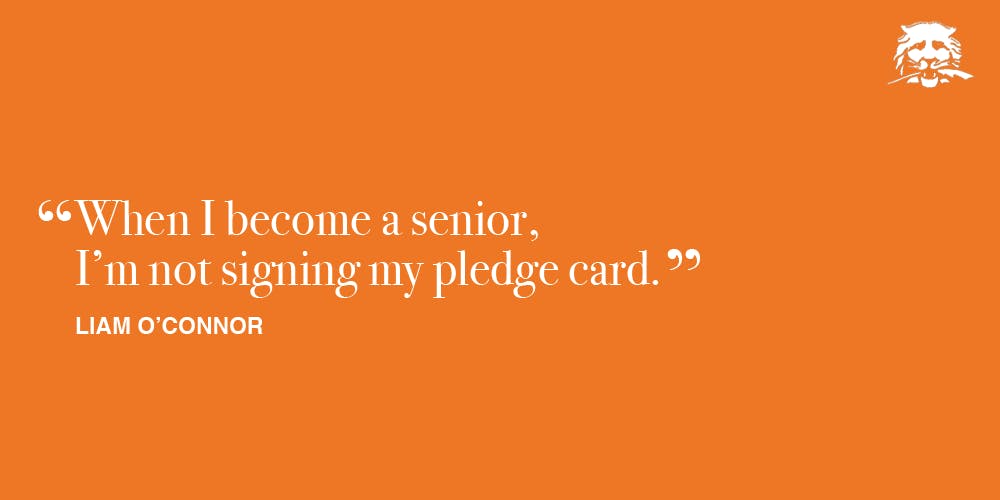Front Campus will soon be filled with enthusiastic students in black robes and mortarboards as Commencement begins. By the time they walk through FitzRandolph Gate for the first time in four years, they will have already partaken in another time-honored Princeton tradition: Annual Giving. As part of the “Senior Class Pledge,” seniors are asked to support their alma mater’s donation drive before it even becomes their alma mater. This tradition should stop; it has minimal costs and will improve the University’s image.
Associate Director of Annual Giving Beth Perrino explained in an email that the senior classes sign pledges to commit their support to Annual Giving during their first four years after graduation. The Class of 2018 has a committee of over 100 students who work to boost pledge rates. Multiple seniors have confirmed that other seniors “hunt you down” to get them to sign cards. Perrino wrote, “We hope [this] habit of support will continue and grow over the years.”
This entire scheme is ingenious. Students are less likely to reject solicitations from classmates than impersonal emails by random administrators. It’s also harder to say “no” to such drives when everyone else is doing it. The Dartmouth reported that the University had the highest senior pledge rate in the Ivy League in 2015 with at least 90 percent of seniors signing pledges during the past few years. By utilizing peer pressure to exploit students’ fears of not conforming with their peers, Annual Giving’s Senior Class Pledge wrangles new graduates to its service.
In general, there is nothing wrong with asking alumni for donations. After all, the University is a charitable organization that provides a world-class education and conducts groundbreaking research. But it’s simply bad optics to ask seniors and the youngest alumni for their support. They just finished four grueling years of rigorous academic study. And they paid for it. Literally.
This school isn’t cheap. All students have been buying things — ranging from meal plans to U-Store items — from the University at monopolistically-inflated prices. That doesn’t even include tuition and room costs.
Certain students have forked over a quarter of a million dollars for their Ivy League education. Although this school has the most generous financial aid package of any in the country, there are still students and families that have to take out loans equivalent to that of a car. Now, the University is asking them for more money, this time under the guise of charity. Begging young graduates makes the University look greedy.
Furthermore, graduating students may not have a stable income for quite some time. When they settle into their new lives, they have to find housing, get a car, and acquire healthcare, among other things. A number of Princetonians will take out massive loans for professional schools. Others will have dismal salaries as they work through graduate school. Giving back to the University isn’t anyone’s top priority during this time.
Last year, 1.1 percent of the $74.9 million raised by Annual Giving came from classes within their first four years after graduation, and the Class of 2013 raised only $552,811 within its first four years. If Princeton ended the Senior Pledge and — in the worst-case scenario — consequently received no funds from the first four class years, it would barely lose a drop in the bucket of Annual Giving’s cumulative donations. Here’s another way to look at it. The average life expectancy in the U.S. is 78.6 years. The University still has 52.6 years of students’ lives to ask them for money if they do not give during their first four years.

Proponents may argue that the Senior Class Pledge merely introduces soon-to-be alumni to Annual Giving and that supporting it can include volunteering time to raise money. The intentions behind this practice may be good, but graduating students only see the school asking for more time and money after they’ve already given it much.
Imposing Annual Giving on young alumni alienates some of them. While there are a lot of great things about the the University experience, let’s not forget the bad parts. Between demanding workloads, an isolating environment, and poor mental health, it’s easy for students to get burned out. These memories are still fresh during the first four years after graduation. Timing is critical when requesting money. Asking graduates too soon after these challenges will make them cynical and turn them away. The least the University could do is give them a break for a few years from the monetary badgering.
I’d like to ensure that the programs from which I benefitted perpetuate for future generations. One day in the distant future, I look forward to giving back to my University as an alumnus. But not while I’m a broke graduate trying to start a career. When I become a senior, I’m not signing my pledge card.









